A guide to accurate customer service and dispute handling
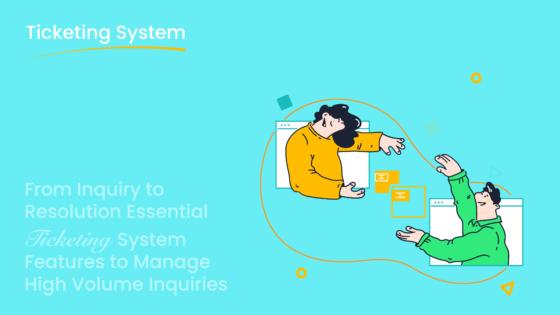
Have you ever wondered how some companies seem to resolve customer service issues so quickly and accurately? Getting customer service right matters. In some industries, like healthcare, teams aim to resolve up to 90% of disputes, showing just how important accuracy is. When you use accurate customer service, you build trust and keep customers coming back. Sobot leads with innovation, using Sobot AI and the Sobot call center to make sure your customer service always puts people first.
Dispute Accuracy
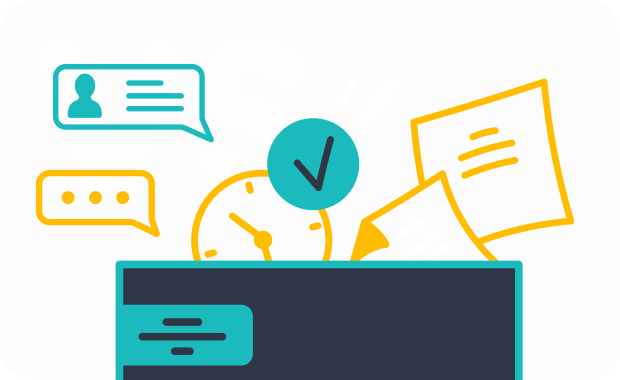
Customer Impact
When you resolve disputes accurately, you make your customers feel heard and valued. Imagine you get a bill with a mistake. You want someone to fix it fast and explain what happened. If you get a clear answer, you trust the company more. Accurate dispute handling helps you avoid confusion and frustration. It also keeps you coming back.
Let’s look at what causes most disputes. Here’s a quick table showing common factors and how you can improve them:
| Factor | Description | Improvement Strategies |
|---|---|---|
| Billing Errors | Mistakes in invoices or charges that confuse or frustrate customers. | Double-check billing details, clear communication, regular audits, responsive customer support. |
| Product/Service Quality Issues | Defective products, poor service, or unmet expectations leading to dissatisfaction. | Quality control, clear and accurate product information, prompt customer service. |
| Misrepresentation/False Advertising | Misleading information about products or services causing customer distrust. | Transparent marketing, honest advertising, avoiding exaggerated claims. |
| Delivery and Shipping Problems | Late deliveries, damaged or lost packages, incorrect shipping info, or hidden fees causing disputes. | Reliable shipping partners, accurate tracking, transparent pricing, proper packaging. |
| Inadequate Problem Resolution | Customer service fails to effectively resolve issues, leaving customers frustrated. | Empowered and trained representatives, multiple communication channels, feedback mechanisms, conflict resolution teams. |
| Poor Communication Skills | Miscommunication or dismissive tone aggravates conflicts and escalates disputes. | Training in communication, consistent and transparent updates, empathetic customer interactions. |
| Fraudulent Transactions | Unauthorized or deceptive transactions leading to disputes. | Fraud prevention measures, secure payment systems, monitoring suspicious activities. |
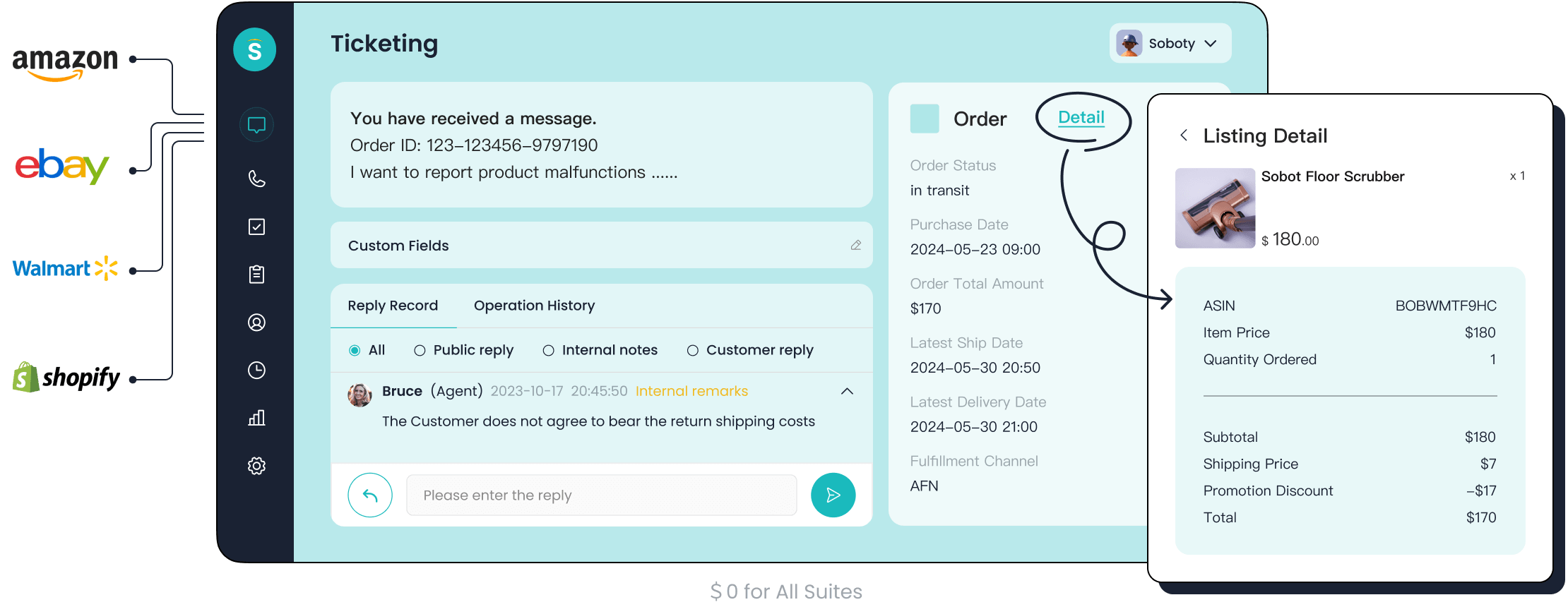
If you use tools like Sobot’s Ticketing System, you can track every step of a dispute. This helps you respond quickly and keep records accurate. Sobot’s unified platform makes it easy to manage customer information and communication, so you can solve problems faster.
Tip: Customers expect a seamless and transparent dispute process. If you handle disputes well, you boost satisfaction and loyalty.
Business Outcomes
Accurate dispute handling does more than keep customers happy. It protects your business and helps you grow. When you fix problems quickly, you avoid costly chargebacks and penalties. For example, Visa’s CE 3.0 initiative shows that providing strong evidence early can stop chargebacks and save revenue (source). If you reduce chargebacks, you lower fees and keep your payment privileges.
Here’s what happens when you focus on dispute accuracy:
- You recover revenue that might be lost to chargebacks.
- You avoid penalties and keep your business reputation strong.
- You find patterns in disputes and prevent future problems.
- You make faster, smarter decisions with real-time data.
- You see higher customer satisfaction scores, like Net Promoter Score (NPS).
Sobot’s Ticketing System helps you improve invoice accuracy and manage disputes across channels. With features like SLA management and analytics, you can spot errors early and fix them before they become bigger issues. OPPO, a leading smart device brand, saw a 94% positive feedback rate after using Sobot’s solutions. That’s proof that accurate dispute handling leads to better business results.
Note: High dispute accuracy means lower operational risks and better financial outcomes. You build trust, keep customers, and grow your business.
Common Issues
When you handle customer service, you see the same problems pop up again and again. Knowing these issues helps you fix them faster and keep your customers happy. Let’s break down the most common trouble spots.
Invoice Disputes
You probably deal with invoice disputes more often than you’d like. These happen when a customer thinks there’s a mistake on their bill. Maybe the amount looks wrong, or a charge appears that shouldn’t be there. Sometimes, customers spot a missing discount or a product they never received. If you don’t solve invoice disputes quickly, you risk losing trust and facing a chargeback. A chargeback means the customer asks their bank to reverse the payment. Too many chargebacks can hurt your business and even lead to extra fees.
Here’s a quick look at the most frequent types of customer service disputes:
| Frequent Customer Service Dispute Type | Description and Supporting Data |
|---|---|
| Long wait times to reach support agent | 52% of consumers report long wait times as a major negative factor; delays in phone, chat, email, and social media responses frustrate customers. |
| Lack of agent knowledge or context | About 50% of customers complain about having to repeat issues; agents often lack product knowledge or context, leading to misinformation and unresolved problems. |
| Difficulties navigating automated systems | 36% of customers prefer waiting for a human over using complicated IVR or AI virtual assistants; customers get stuck in phone menu loops. |
| Unfriendly or impolite agents | Poor attitude and lack of empathy from agents cause dissatisfaction; agent burnout and disengagement contribute to negative interactions. |
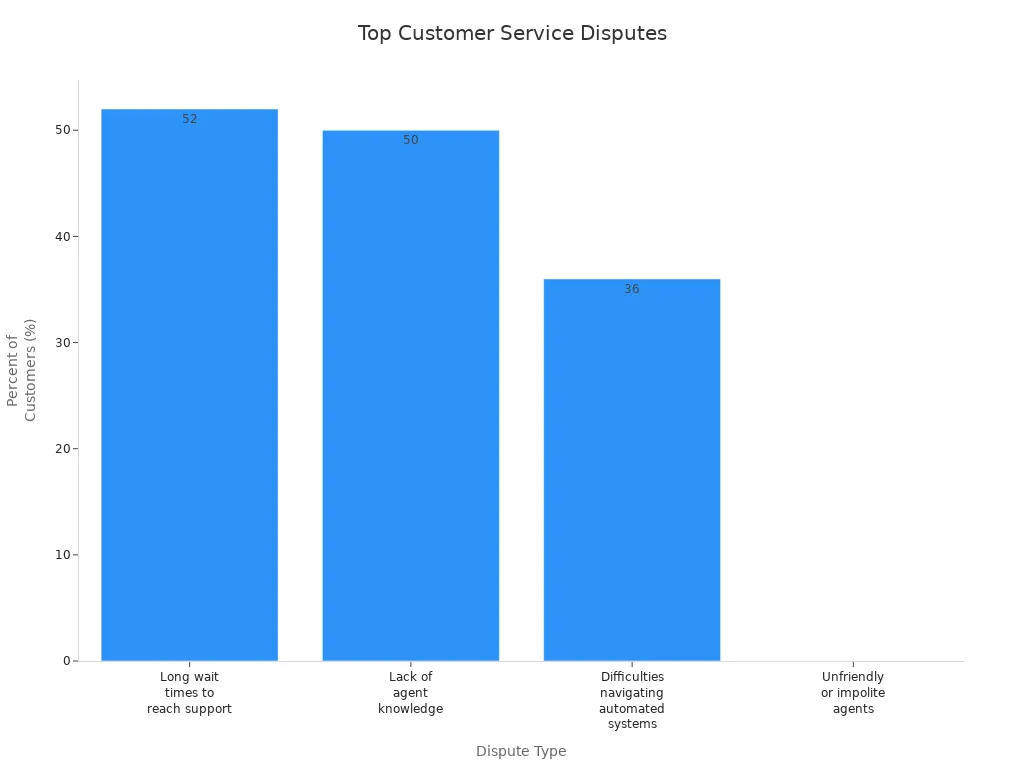
If you use a tool like Sobot’s Ticketing System, you can track every invoice dispute, respond faster, and keep a clear record. This helps you avoid chargebacks and keep your business running smoothly.
Invoice Processing Errors
Invoice processing errors can sneak up on you. These mistakes often come from manual data entry, like typing the wrong number or missing a detail. Sometimes, the system reads a blurry invoice wrong, or someone enters the wrong tax rate. You might see duplicate invoices or mismatched prices. These errors slow down payments and lead to more chargebacks if customers get frustrated.
Here are some common causes of invoice processing errors:
- Data entry mistakes from typing or copying numbers.
- Incorrect supplier or buyer information.
- Duplicate invoices from resubmissions.
- Missing purchase order numbers.
- Quantity or price mismatches.
Manual data entry errors happen in about 1% of invoices, so if you process 1,000 invoices, you could see 10 mistakes. Automated tools, like Sobot’s Ticketing System, help catch these errors early. The system matches invoices with purchase orders and alerts you to problems before they turn into chargebacks.
Service Complaints
Service complaints can make or break your relationship with customers. When someone feels ignored or gets a slow response, they might leave a bad review or switch to another company. If you handle complaints well, you boost satisfaction and keep customers loyal. If you don’t, you risk more chargebacks and negative word-of-mouth.
Tip: Make it easy for customers to share complaints. Quick, friendly responses turn unhappy customers into loyal fans.
Research shows that when you solve complaints quickly, customers stay longer and tell others about your great service. If you use Sobot’s Omnichannel Solution, you can manage complaints from email, chat, or social media in one place. This makes it easier to spot problems and fix them before they lead to a chargeback.
Resolution Steps
Handling customer disputes can feel overwhelming, but you can break it down into clear steps. When you follow a proven process, you make sure every customer feels heard and every issue gets solved. Let’s walk through each step together.
Acknowledge Promptly
When a customer reaches out with a problem, your first move should be to acknowledge it right away. Quick acknowledgment shows you care and sets a positive tone for the rest of the conversation. Even if you don’t have an answer yet, a simple message like, “Thank you for letting us know about this,” or “I understand how frustrating this must be,” can calm the situation.
Customers want to know you’re listening. Immediate acknowledgment helps de-escalate frustration and builds trust.
With Sobot’s Ticketing System, you never miss a dispute. The system automatically creates a ticket for every issue, sends instant notifications, and keeps customers updated. This means you can respond quickly, even during busy times. Studies show that when you acknowledge disputes right away, you increase your chances of a successful resolution and stronger customer relationships.
Active Listening
Active listening is more than just hearing words. You need to show customers you’re paying attention. This means making eye contact if you’re face-to-face, nodding, or using phrases like, “I see,” or “I understand.” You can also repeat back what the customer said to make sure you got it right.
Here are some active listening techniques you can use:
- Give your full attention and avoid distractions.
- Use short affirmations like “I understand” or “Go on.”
- Paraphrase what the customer said to confirm understanding.
- Ask open-ended questions to get more details.
- Hold off on judging or interrupting.
- Respond with empathy, showing you care about their feelings.
- Work together to find a solution.
When you use Sobot’s unified communication workspace, you see all messages and notes in one place. This helps you keep track of every detail, so you don’t miss anything important during dispute resolution.
Empathy and Apology
Empathy is your superpower in customer service. When you show you understand how the customer feels, you help lower their anger and build trust. Even if the problem wasn’t your fault, a sincere apology can go a long way. Try saying, “I’m really sorry this happened,” or “I can see why you’re upset.”
Research shows that empathy and apologies change the mood of a conversation. They help people move from anger to understanding. When you apologize, you show respect and help the customer feel valued. This makes it easier to work together on a solution.
Sobot’s Ticketing System lets you add notes and canned responses, so you can quickly send thoughtful, personalized apologies. This keeps your communication consistent and genuine.
Clarify and Summarize
Before you jump to solutions, make sure you and the customer are on the same page. Clarify their concerns by summarizing what you’ve heard. For example, you might say, “If I understand correctly, you’re upset about the delay in your order. Is that right?” This gives the customer a chance to correct you if needed.
Here’s a simple way to clarify and summarize:
- Listen without interrupting.
- Repeat the issue in your own words.
- Ask questions if something isn’t clear.
- Confirm with the customer that you got it right.
This step helps prevent misunderstandings and shows you care about getting things right. With Sobot’s system, you can review all previous messages and tickets, making it easier to summarize the issue accurately.
Action Plan
Now it’s time to fix the problem. A good action plan is clear, organized, and keeps the customer informed. You should explain what you’ll do, who will handle it, and how long it will take. If you need to investigate, let the customer know what steps you’ll take.
Here’s a table showing what to include in your action plan:
| Element | Description |
|---|---|
| Clear Roles and Accountability | Assign tasks to specific team members and set deadlines. |
| Consistent Process | Follow standard steps for every dispute to avoid confusion. |
| Root Cause Analysis | Find out why the problem happened, so you can fix it for good. |
| Accurate Data | Double-check all information to avoid more mistakes. |
| Automation | Use tools like Sobot’s Ticketing System to automate updates and reminders for each step. |
Sobot’s Ticketing System helps you manage every part of the action plan. You can set SLAs (service level agreements) to make sure you meet deadlines, track progress, and use analytics to spot trends. This keeps your dispute resolution process smooth and reliable.
Follow-Up
Don’t stop once you’ve fixed the problem. Following up shows you care about the customer’s experience. You can send a thank-you note, ask for feedback, or offer a small gesture like a discount. This extra step helps turn a negative experience into a positive one.
Some good follow-up practices include:
- Sending a thank-you message.
- Asking if the solution worked for them.
- Offering a small reward or discount.
- Checking in later to make sure everything is still okay.
Sobot’s system can automate follow-up emails and reminders, so you never forget this important step. Customers who get follow-ups are more likely to stay loyal and recommend your business to others.
Let’s put it all together. Here’s a quick table summarizing the key phases and actions for effective dispute resolution:
| Phase | Key Actions and Strategies |
|---|---|
| Investigate Dispute | Check invoice accuracy, confirm service, review contracts, communicate clearly, and get dispute details in writing. |
| Resolve Dispute | Own mistakes, apologize, clarify with evidence, negotiate, document the outcome, and stand firm if needed. |
| Prevent Disputes | Use clear contracts, accurate invoicing, proofread, keep clients informed, and follow up after service. |
| Maintain Relationships | Focus on the problem, listen actively, show empathy, seek win-win solutions, and use disputes to improve your process. |
By following these steps and using tools like Sobot’s Ticketing System, you can handle disputes with confidence. You’ll save time, reduce errors, and keep your customers happy. Remember, great dispute resolution is not just about fixing problems—it’s about building trust and turning challenges into opportunities for growth.
Best Practices for Accurate Customer Service
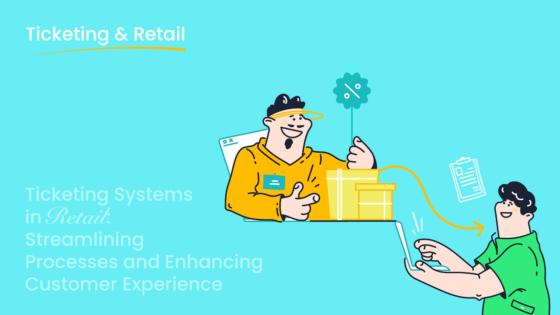
Delivering accurate customer service takes more than just good intentions. You need clear steps and the right tools to make sure every customer gets the help they need. Let’s look at three best practices that can help you and your team reach new heights.
Documentation
Good documentation is the backbone of accurate customer service. When you keep detailed records, you avoid confusion and solve disputes faster. Here’s how you can make documentation work for you:
- Write down every customer interaction, including dates and details.
- Use digital tools to store and organize records, so nothing gets lost.
- Keep copies of invoices, shipping documents, and contracts.
- Set up a process for logging complaints and resolutions.
With Sobot’s Ticketing System, you can track every step of a dispute. The system keeps all your notes, messages, and documents in one place. This makes it easy to review what happened and provide accurate customer service every time.
Quality Assurance
You want your customer service to be the best it can be. Quality assurance helps you spot mistakes and improve your process. Try these steps:
- Monitor calls, chats, and emails to check for accuracy.
- Use scorecards to rate how well your team handles each case.
- Give feedback and coaching to help your team grow.
- Set clear goals and measure results with KPIs like CSAT and NPS.
Sobot’s Omnichannel Solution lets you review every customer interaction. You can see where things go right and where you need to improve. This leads to better customer satisfaction and fewer repeat problems.
Automation Tools
Automation makes accurate customer service faster and easier. Tools like Sobot’s Ticketing System use AI to route tickets, send reminders, and handle simple questions. Here’s a quick look at the benefits:
| Benefit | How It Helps You |
|---|---|
| Faster Ticket Resolution | AI speeds up answers by 52% |
| Lower Costs | Automation cuts service costs by 30% |
| Fewer Errors | Automated tasks reduce mistakes |
| Better Focus | Your team can handle complex issues, not busywork |
OPPO, a global smart device brand, used Sobot’s solutions to boost accuracy and satisfaction. They saw a 94% positive feedback rate and a 57% increase in repeat customers. When you use automation, you give your customer service team more time to focus on what matters most—helping people.
Tip: Accurate customer service starts with the right habits and the right tools. Keep improving, and your customers will notice.
Prevention Strategies
Transparent Policies
You can stop many disputes before they start by making your policies clear and easy to find. Customers want to know what to expect. If you show your refund terms, fees, and shipping details up front, you build trust. Clear product descriptions and accurate billing help customers feel confident. When you use service level agreements (SLAs) and share performance benchmarks, you set the rules for everyone. Honest communication, even when things go wrong, keeps customers satisfied. Sobot’s Ticketing System lets you store and share policy documents with customers, so everyone stays on the same page.
Tip: Transparent policies mean fewer surprises and less confusion. Customers who understand your rules are less likely to start a dispute.
Staff Training
Your team needs the right skills to handle tough situations. Training programs that teach conflict management and de-escalation help staff stay calm and professional. When your employees know how to spot problems early and talk to upset customers, they can fix issues before they grow. Ongoing training also boosts job satisfaction, which leads to happier customers. Sobot’s unified workspace makes it easy for staff to access customer history and notes, so they can give fast, accurate answers. Well-trained teams are key to chargeback prevention and keeping disputes low.
Proactive Communication
Reach out to customers before they have a chance to complain. After a delivery or service, a quick follow-up message shows you care. Only about 4% of unhappy customers speak up, so you need to check in first. Proactive communication helps you catch small problems early and stop them from turning into big disputes or chargebacks. Sobot’s Omnichannel Solution lets you send updates and reminders across email, chat, and social media. When you keep customers informed, you build trust and support chargeback prevention.
| Prevention Strategy | How It Helps You |
|---|---|
| Transparent Policies | Sets clear expectations |
| Staff Training | Empowers team to resolve issues |
| Proactive Communication | Stops disputes before they start |
Maintaining Relationships
Building strong customer relationships doesn’t stop when you solve a dispute. You need to keep trust high and show customers you care. Let’s look at three ways you can do this every day.
Positive Language
The words you choose matter a lot. When you use positive language, you help calm upset customers and turn a tough moment into a chance to build better customer relationships. For example, instead of saying, “I can’t do that,” try, “Let’s see what we can do together.” This small change makes people feel heard and respected.
- Positive language helps lower tension and keeps conversations friendly.
- Phrases like, “Thank you for your patience,” or “I appreciate you sharing this,” show empathy.
- Customers who feel valued are more likely to stay loyal, even if things go wrong.
Tip: Customers often prefer companies that use kind words, even if prices are higher, because they feel respected and cared for.
Sobot’s Ticketing System lets you use canned responses with positive language, so your team always sounds helpful and supportive.
De-escalation
Sometimes, customers get really upset. You can use de-escalation techniques to keep things calm and protect customer relationships. Here’s a simple list to help you:
- Listen closely and let the customer finish speaking.
- Stay calm and use a steady, gentle voice.
- Use positive words and focus on what you can do.
- Set clear, polite boundaries if needed.
- Offer clear solutions and let the customer help choose what works best.
If you spot a problem early, you can step in before things get worse. Sobot’s Omnichannel Solution helps you track conversations across channels, so you can respond quickly and keep things under control.
Remember: Staying calm and using positive language can turn a heated moment into a chance to strengthen customer relationships.
Customer Follow-Up
After you fix a problem, don’t forget to check in with the customer. A simple follow-up call or email shows you care about their experience. This step helps you build long-term customer relationships and keeps trust strong.
- Thank customers for their patience and feedback.
- Ask if the solution worked and if they need anything else.
- Offer a small gesture, like a discount or helpful tip.
- Use feedback to improve your service for next time.
| Follow-Up Strategy | What You Do | Why It Works |
|---|---|---|
| Personalized Check-In | Send a thank-you note or call after resolution | Shows you value the customer’s experience |
| Feedback Request | Ask for feedback on how you handled the dispute | Helps you learn and improve your service |
| Proactive Support | Offer extra help or tips before issues arise | Builds trust and keeps customers loyal |
Sobot’s automation tools make it easy to send follow-up messages and track feedback, so you never miss a chance to connect.
Following up after a dispute is one of the best ways to turn a one-time fix into a lasting relationship.
When to Escalate
Sometimes, you do everything right, but a customer dispute just won’t go away. You might fix small problems with a quick reply or a refund, but some issues need extra help. Knowing when to escalate a dispute can save you time, money, and even your reputation. If you wait too long, you risk a chargeback, which can hurt your business.
Here’s a simple list to help you decide when to escalate a dispute:
- You follow your process, but the problem stays unresolved.
- The issue breaks your service level agreement (SLA) or takes too long.
- The customer’s satisfaction score drops, and they threaten a chargeback.
- The problem is too complex for your team to handle.
- You see signs of fraud or legal risk.
You need a clear escalation structure. Make sure your team knows who handles escalations and what skills they need. Train your team to spot chargeback risks and use tools like Sobot’s Ticketing System to track every step. Sobot helps you set SLAs and automate reminders, so you never miss an escalation point.
Tip: Escalate quickly if you see a chargeback warning or if the dispute could damage your business.
Legal Help
Sometimes, a dispute gets serious. Maybe a customer files a chargeback, or you spot fraud. You might need legal help if the issue involves contracts, payments, or big losses. Lawyers can help you gather evidence, respond to chargebacks, and protect your business. Sobot’s system keeps all your records in one place, making it easy to share documents with your legal team.
If you get a chargeback notice, act fast. Collect all the facts, review your policies, and reach out to your lawyer if needed. Legal help can stop a chargeback from turning into a bigger problem.
Third-Party Mediation
Not every dispute needs a lawyer. Sometimes, you can solve problems with third-party mediation. Mediation means a neutral person helps you and the customer talk things out. According to a survey, more than half of business lawyers and executives think mediation works best for business disputes (source). Mediation helps you avoid chargebacks and keeps relationships strong.
You might use mediation if a customer threatens a chargeback, but you want to keep them happy. Sobot’s Omnichannel Solution lets you share records and messages with mediators, making the process smooth. Mediation often leads to better outcomes and higher satisfaction for everyone.
Note: Escalate to mediation if you want to avoid a chargeback and keep your customer relationship healthy.
You can master customer service by following clear steps: acknowledge issues, listen actively, show empathy, clarify, act fast, and follow up. Sobot’s Ticketing System helps you track every customer service interaction and automate your workflow. OPPO boosted customer service satisfaction to 94% using Sobot. If you want long-term customer service success, start using best practices and smart tools. Ready to level up your customer service? Explore Sobot’s solutions or email us at marketing@sobot.io.
Great customer service builds trust and keeps customers coming back.
FAQ
What makes accurate customer service so important?
Accurate customer service helps you avoid mistakes and keeps your customers happy. Studies show that 94% of customers will buy again if you solve their problems quickly. Using tools like Sobot’s ticketing system makes dispute handling much easier and more reliable.
How does Sobot’s ticketing system help with dispute handling?
Sobot’s ticketing system tracks every step of a dispute. You can see all messages, set reminders, and keep records in one place. This helps you solve customer service issues faster and with fewer errors.
Can I manage customer service across different channels with Sobot?
Yes! Sobot’s omnichannel solution lets you handle customer service on email, chat, phone, and social media—all in one workspace. You never miss a message, and you can respond to disputes from anywhere.
What should I do if a customer dispute gets complicated?
If a dispute feels too complex, you can use Sobot’s ticketing system to organize details and set escalation rules. Sometimes, you may need legal help or third-party mediation. Always keep clear records for better dispute handling.
How can I prevent customer service disputes before they start?
You can prevent most disputes by sharing clear policies, training your team, and using proactive communication. Sobot’s tools help you send updates, store documents, and follow up with customers, making dispute handling smoother from the start.
Tip: Great customer service and smart dispute handling build trust and keep your business growing!
See Also
Effective Strategies To Improve Customer Satisfaction In Live Chat
Comprehensive Overview Of Quality Management Systems For Call Centers
Leading Customer Service Software Solutions To Watch In 2024
How To Select The Best Social Media Support Software Easily
Essential Insights Into Quality Assurance Tools For Call Centers
